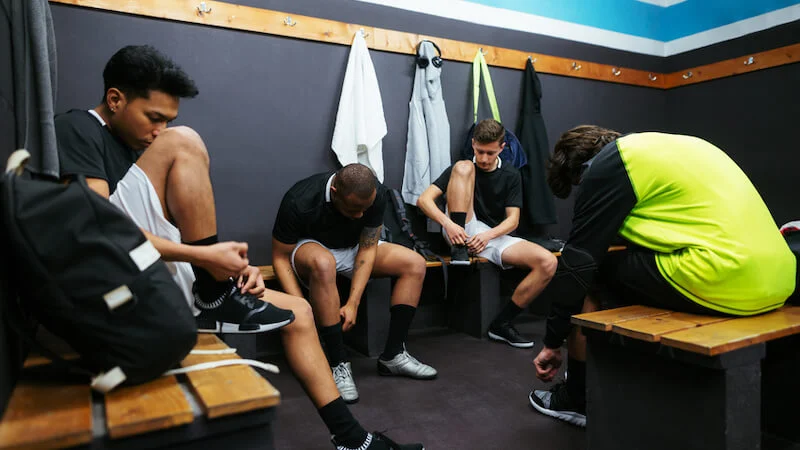
12 Sports Psychology Techniques & Tips for Coaching Athletes
Sports psychology techniques and tips can help athletes push themselves to the next level. Some of these psychological skills include: regulating thinking and emotions, identifying and changing negative self-talk, and developing leadership skills.
Athletes also need to be able to focus their attention in a game of sports, regardless of distractions like timers or teammates. A sport psychologist might suggest strategies such as visualizing success or focusing on the present to improve attentional control.
1. Identifying and Managing Stress
Professional athletes often face high pressure situations that can cause stress and distraction. Sports psychology helps athletes develop strategies for identifying and managing stress to improve performance.
Some stress management techniques, such as visualizing and goal setting, help athletes get mentally prepared for a competition. Others, such as stress inoculation training, involve exposing athletes to various levels of arousal and teaching them coping skills to reduce anxiety and enhance performance.
2. Strengthening Communication Skills
Athletes must learn to communicate verbally and non-verbally with teammates and coaches. This involves building trust and a sense of teamwork.
Sports psychology also helps athletes develop leadership skills. This can be especially important when dealing with injuries or other issues that threaten the team’s success.
Managing nerves before competition is another area where sports psychology can help. This may include learning relaxation techniques, changing negative thoughts and finding distractions to stay focused.
3. Setting Goals
Set realistic and meaningful goals for your athletes. Encourage them to focus on both process and performance goals. Process goals are those that describe how a goal should be achieved (e.g., follow through on a shot) while performance goals describe how well the goal should be accomplished.
Identify obstacles to goal attainment and discuss how athletes can overcome these challenges. Asking this question teaches them to take ownership of their goals.
4. Developing Self-Awareness
Developing self-awareness is an important aspect of sports psychology. It can help athletes understand their emotions and thoughts during a game, which can lead to better performance.
Developing self-awareness can also help athletes recognise their blindspots. One way to do this is by using the Johari Window, which allows athletes to see how others perceive them. This can help them identify their strengths and weaknesses.
5. Developing Confidence
Athletes who feel confident in their abilities are better able to focus on the task at hand, remain calm and make sound decisions during competitions.
Researchers have identified many ways that coaches can help their athletes develop and maintain confidence, including encouraging positive self-talk, promoting realistic expectations and using visualization techniques. They can also encourage their athletes to identify the thoughts that deteriorate confidence and to replace those with more supportive ones.
6. Developing Leadership Skills
Competitive sports require a lot of motivation and determination. Sport psychology coaches often help athletes develop strategies to boost their motivation and improve their mental toughness.
They also teach them to focus their attention on the present moment and to tune out distractions, such as timers and teammates. They may use techniques like mental visualization. They also help athletes develop goal setting skills. They must be able to create SMART goals that are specific, measurable, attainable, relevant and time-framed.
7. Reducing Anxiety
Many athletes experience anxiety before a game, competition or performance. This can have a negative impact on their performance and lead to burnout.
Athletes can learn strategies to reduce their nerves and perform well under pressure. This includes learning how to monitor their internal conversations, changing negative self-talk and finding ways to stay motivated. They also learn to use visualization techniques.
8. Developing Mental Toughness
Athletes who want to be great need to develop a strong mental game. This requires discipline, control and self-reliance. It also means accepting that success is a marathon, not a sprint, and staying motivated with positive self-talk.
While some athletes may have this innate quality, it can be developed through sports psychology techniques such as visualization, goal setting, and self-talk. It’s one of the best ways to improve performance under pressure.
9. Developing Perseverance
Just like physical skills, sports psychology techniques require repetition to become effective. Coaches can implement them into their athletes’ training routines to help them overcome mental roadblocks and reach their performance goals.
Self-belief, dedication and focus are common traits among top-class athletes. Developing these skills is key for a successful athlete and can be done through sports psychology techniques such as positive self-talk.
10. Developing Self-Control
Athletes need to be able to control their emotions and behaviors, particularly when they’re under pressure. But researchers found that excessive self-control exertion may actually damage sports skill performance by inhibiting motivation.
Athletes must also be able to stick to workout schedules over extended periods of time. So, sports psychologists help athletes develop self-control. They teach them strategies to avoid potentially life-disruptive impulsive behaviors.




